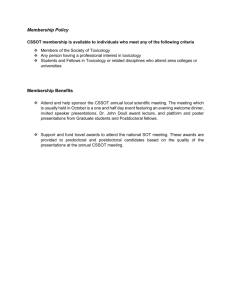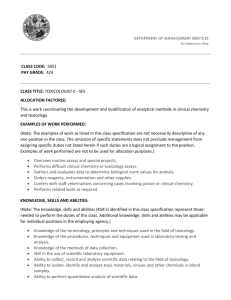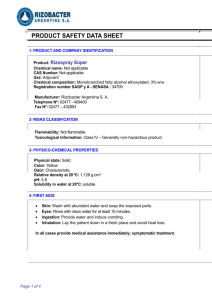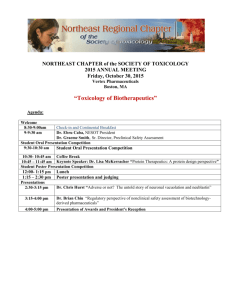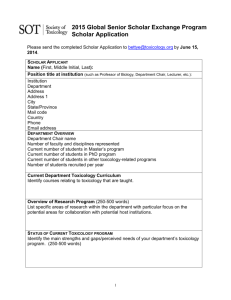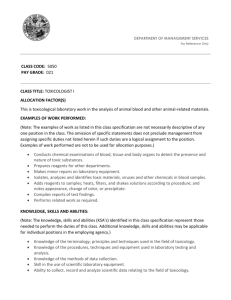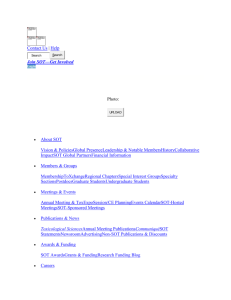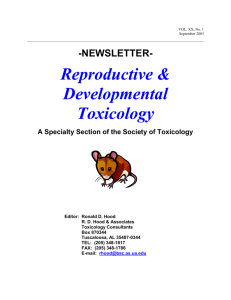May 2005 Newsletter - Society of Toxicology
advertisement
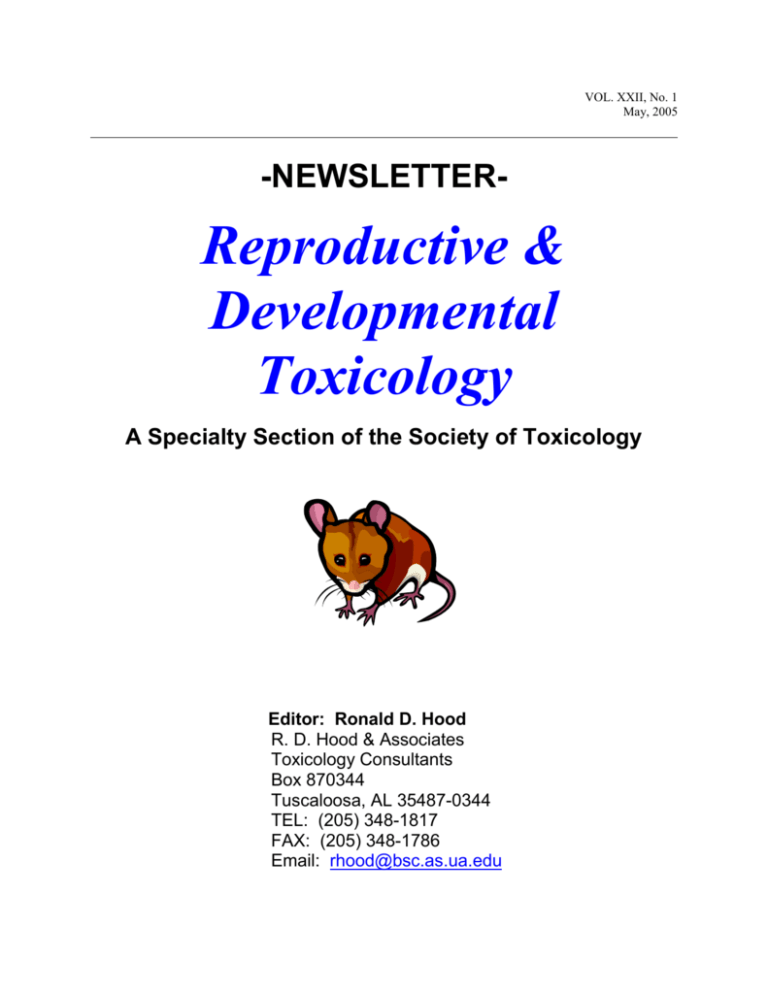
VOL. XXII, No. 1 May, 2005 -NEWSLETTER- Reproductive & Developmental Toxicology A Specialty Section of the Society of Toxicology Editor: Ronald D. Hood R. D. Hood & Associates Toxicology Consultants Box 870344 Tuscaloosa, AL 35487-0344 TEL: (205) 348-1817 FAX: (205) 348-1786 Email: rhood@bsc.as.ua.edu 1 IN-COMING PRESIDENT’S MESSAGE I am looking forward to serving as RDTSS President in the coming year. I would like to sincerely thank John Rogers, Out-going President, and Carole Kimmel, Out-going Past President, for their guidance and commitment to the Specialty Section over the last few years, and also our out-going Senior Councilor, Kim Boekelheide, for his contributions over the past two years. I look forward to working with our current Executive Committee: John RogersPast President, Jerry Heindel-Vice President, George Foley – Secretary/Treasuresr, Eve Mylchreest – Senior Councilor, and incoming new members – Shelley Tyl – Vice President Elect, and Bill Kelce – Junior Councilor. I would especially like to welcome our first New Career Councilor – Barry McIntyre, and Student Councilor – Rayetta Grasty. proposals submitted for RDTSS endorsement. While the proposals received were excellent, the number of proposals was somewhat disappointing. Five proposals for symposia, workshops or roundtables were submitted for primary endorsement and an additional six were submitted for RDTSS secondary endorsement. We had two additional proposals for CE courses. I will work with Jerry Heindel this year to develop a strategy to identify topics early and solicit proposals for the 2007 program. Again, I would like to thank the RDTSS membership for giving me this opportunity, and I look forward to serving you over the coming year. I encourage all members to contact me at any time with any questions, comments, or suggestions related to the Specialty Section. Dana Shuey I would also like to thank Ron Hood, our RDTSS Newsletter editor and Web Liaison for the RDTSS website. Please continue to provide Ron with items of interest for the newsletter and website. As President, I would like to continue the emphasis of the past few years under Carole’s initiative to increase the membership and involvement of students and scientists in the early years of their careers in our Specialty Section. The addition of a New Career Councilor (a member within 5 years of completion of formal training) and a Student Councilor to our Executive Committee will provide excellent leadership opportunities for younger members of our Specialty Section and a means to identify and address issues of particular importance to these members. At this year’s meeting, the Executive Committee also proposed and membership approved an extension to our student travel awards to provide additional financial support to students that apply for our Trainee Awards. So please encourage your students to apply!! The program for SOT 2006 already promises to be very interesting. We had several exciting AWARDS Student Presentation Awards Winners of these awards for 2005, for which there were nine applicants, were: First place ($400; plaque; $130 certificate for Taylor and Francis books): Kartik Shankar, Postdoctoral Fellow, Department of Pharmacology and Toxicology, University of Arkansas for Medical Sciences, Little Rock,. for “Microarray-based analysis of nutrition-ethanol interactions during gestation.” 2 Second place ($100; plaque; $100 certificate for Taylor and Francis books): Bin Gong, Postdoctoral Fellow, Departments of Pathology and Physiology, University of Texas Southwestern Medical Center, Dallas, for “Fetal basis of dissecting aortic aneurysm.” Best Paper in Toxicological Sciences The winner of the award for was: KP Lehmann, S Phillips, M Sar, PM Foster and KW Gaido. 2004. Dose-dependent alterations in gene expression and testosterone synthesis in the fetal testis of male rats exposed to di(n-butyl) phthalate. Toxicol. Sci. 81(1): 6080. STUDENT TRAVEL FUNDING AVAILABLE Graduate Student Travel Awards defray expenses for students presenting platform talks or posters at the annual meeting. To be eligible, the student must be an SOT member (or have submitted a membership application) who has not previously received a graduate student travel award. Each institution may rank and submit applications from students (maximum of three students). There will be a change for next year. All RDTSS applicants judged responsive will receive a travel award from a $2000 set aside. This set aside is in addition to the current award set aside, which is $1000. Mentors: Encourage Students to Apply for SOT Membership Early Graduate and post-doctoral students need to apply now for SOT membership to be eligible for 2006 student travel awards and reduced SOT Annual Meeting fees. The on-line membership application is convenient and the only certification required is from the student’s major advisor or director of graduate studies. Since September 1 is the deadline for applications to be complete, students need to apply prior to the fall semester. Students with questions about membership can e-mail Rosibel Alvarenga at SOT Headquarters. 2005 Program Sessions Sponsored or Co-Sponsored by RDTSS Several RDTSS-related activities were included in the 44th Annual meeting of the Society of Toxicology in New Orleans. The following scientific sessions were sponsored or cosponsored by the RDTSS: Continuing Education Courses Developmental Toxicology Studies: Design, Interpretation, and Risk Assessment Chairpersons: Joseph F. Holson, WIL Research Laboratories, Inc, Ashland, OH and Ronald D. Hood, RD Hood & Associates, Toxicology Consultants, Tuscaloosa, AL. (cosponsor = Risk Assessment) Male Reproductive Hazard Identification and Risk Assessment in Pharmaceutical Development (What Do You Do Now That You Have a Signal?) Chairpersons: Michael W. Conner, Theravance, Inc., South San Francisco, CA and Robert E. Chapin, Pfizer, Inc., Groton, CT. (cosponsors = Regulatory & Safety Evaluation; Toxicologic & Exploratory Pathology) Symposia Environmental Factors Affecting Breast Cancer Susceptibility (cosponsored with: Carcinogenesis; Toxicologic and Exploratory Pathology; Women in Toxicology) Developmental Toxicology of the Lung (Cosponsor = Student Advisory Committee) Systems Biology: Approaches and Applications to Toxicology (cosponsored with: Neurotoxicology; Risk Assessment) 3 Workshops Current Regulatory and Scientific Views Regarding Chemical Hazards to Children (cosponsored with: Ethical, Legal, & Social Issues; Regulatory & Safety Evaluation; Risk Assessment) Sunset Session Brominated Flame Retardants: New Findings (cosponsored with: Neurotoxicology; Occupational & Public Health; Risk Assessment) MEETINGS OF INTEREST The Duke/NIEHS Environmental Epigenomics, Imprinting, and Disease Susceptibility Conference will be held on November 2-4 at the Washington Duke Inn, Durham, NC. Details are available at: http://www.geneimprint.com/meetings/2005dur ham/schedule.html The Third International Congress on Developmental Origins of Health & Disease (DOHaD) will be held on November 16-20 at The Westin Harbour Castle, Toronto, Canada. Details are available at: http://www.dohadsoc.org/ The “First International Workshop on Modifiers of Chemical Toxicity: Implications for Human Health Risk Assessment” will be held on Poros Island, Greece, June 12-15. For details see: http://eohsi.rutgers.edu/conference/ RECENT PUBLICATION OF INTEREST [This section of the Newsletter was suggested by our VP, Jerry Heindel. He proposed that we create a section on “new and interesting publications of merit,” and asked Paul Foster to contribute the comments that follow. Future contributions would be welcome.] The recent paper by Swan et al. (http://ehp.niehs.nih.gov/docs/2005/8100/abstra ct.html) entitled “Decrease in anogenital distance (AGD) among male infants with prenatal phthalate exposure” provides some very interesting human data in a relatively small study of male infants for which prenatal urine samples from their mothers (85 in total) had been analyzed for phthalate metabolites. The results indicated a significant decrease in anogenital distance (AGD; corrected for bodyweight) and an enhanced incidence of incomplete testicular descent related to increased phthalate exposure. Decreased AGD measurements in rodents (the growth of the perineum is under androgen control) is one of the more sensitive indices of the effects of specific phthalates on reproductive development. This end point may be permanently changed by these agents and is part of a syndrome of reproductive effects initiated in utero which also includes cryptorchidism, hypospadias, decreased sperm count, reproductive tract malformations and retention of nipples/ areolae. AGD has been reported as significantly reduced with di-n-butyl phthalate (the metabolites of which were measured in this study) at 100 mg/kg/d with a NOAEL of 50 mg/kg/d. The predicted exposure to phthalates from the metabolite levels noted in the human samples associated with reduced AGD were significantly less than those producing similar effects in rodents. The use AGD in human male infants as a non-invasive marker of potential endocrine disturbance is an interesting approach that has been derived from the toxicological community, where AGD is recognized as a robust measurement that is a triggered end point in regulatory multigeneration reproduction studies and that provides valuable information on endocrine disruption by phthalates and other antiandrogens. ---Contributed by Paul Foster 4 CALL FOR NEWS Please send any newsworthy items to the RDTSS Newsletter Editor, Ron Hood, at the address listed on the cover page. Email is the preferred way to send news, either in the body of the message or as an attachment. Also, please be sure to describe the purpose of your message in the subject line of your email so I won’t assume it is just more spam and delete it without ever opening it! ENCOURAGE YOUR STUDENTS TO JOIN RDTSS Mentors of graduate students, please encourage them to join our specialty section. Our students and postdocs are the future of the RDTSS. 2004-2005 RDTSS OFFICERS CONTACT INFORMATION President Dana L. Shuey Endo Pharmaceuticals, Inc. Preclinical Safety Assessment 100 Endo Blvd. Chadds Ford, PA 19317 TEL: (610) 558-9800 FAX: (484) 840-4291 E-mail: shuey.dana@Endo.com Vice President Jerrold Heindel NIEHS, DERT P O Box 12233 Mail Drop EC23 Research Triangle Park, NC 27709 TEL: (919) 541-0781 Fax: (919) 541-5064 E-mail: heindelj@niehs.nih.gov Vice President-elect Rochelle Tyl RTI International Center for Life Sciences & Toxicology Hermann Building 3040 Cornwallis Road Research Triangle Park, NC 27709-2194 TEL: (919) 541-5972 FAX: (919) 541-5956 E-mail: rwt@rti.org Secretary/Treasurer George Foley Pfizer, Inc. Safety & Risk Management MS 2-1B/1 2800 Plymouth Road Ann Arbor, MI 48105 TEL: (734) 622-3383 FAX: (734) 622-1778 E-mail: george.foley@pfizer.com Past President John Rogers USEPA Reproductive Toxicology Div. MD 67 Research Triangle Park, NC 27711 TEL: (919) 541-5177 FAX: (919) 541-4017 E-mail: rogers.john@epa.gov Senior Councilor Eve Mylchreest DuPont Haskell Laboratory Developmental Reproductive and Neurobehavioral Tox 1090 Elkton Road P O Box 50 Newark, DE 19714 TEL: (302) 366-6543 FAX: (302) 366-5003 E-mail: eve.mylchreest@usa.dupont.com Junior Councilor William Kelce Pfizer Inc World Wide Safety Sciences 7000 Portage Road KZO-300-417.4 Kalamazoo, MI 49001 TEL: (269) 833-1742 5 FAX: (269) 833-9722 E-mail: william_kelce@yahoo.com New Career Councilor Barry McIntyre Schering Plough Research Institute Reproductive Toxicology P O Box 32 144 Route 94 Lafayette, NJ 07848 TEL: (973) 940-4639 FAX: (973) 940-4509 E-mail: barry.mcintyre@spcorp.com Student Councilor Rayetta Grasty University of North Carolina Curriculum in Toxicology 1538 Country Lane Durham, NC 27713 TEL: (919) 541-3542 E-mail: grastyrc@med.unc.edu
